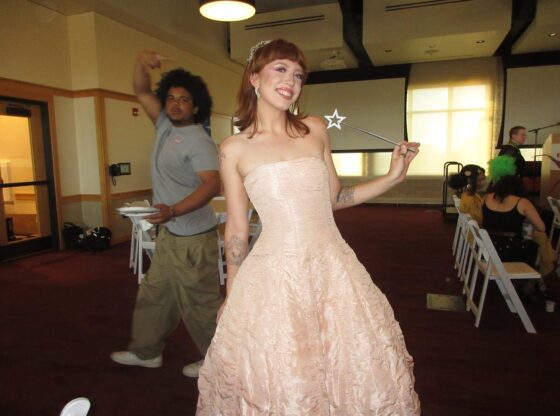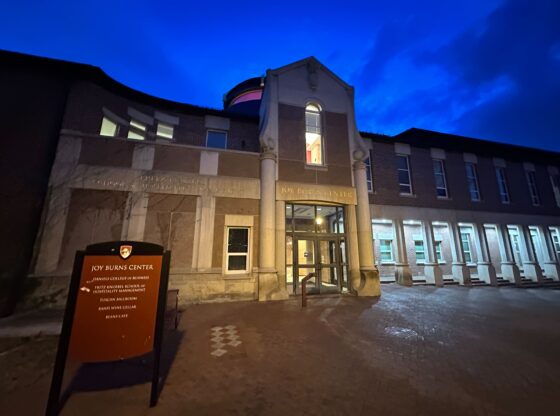Native American women, girls and two-spirits are murdered at a rate 10 times higher than the national average. Almost half of Native women experience sexual and/or intimate partner violence in their lifetime. Murder is the third-leading cause of death for Indigenous women.
But there is so much more to the issue of Missing and Murdered Indigenous Women, Girls and 2-Spirits (MMIWG2S) than the statistics. These individuals deserve the same level of recognition, respect and justice as their white peers who are victimized at much lower rates.
The short film “Who She Is” was produced to celebrate the lives of four Indigenous women from Wind River in Wyoming who were victims of violence, murder and/or trafficking. The film begins by presenting context on the MMIWG2S epidemic in the U.S., then proceeds to narrate each woman’s life from a first-person perspective accompanied by animations produced by Indigenous artists.
“Who She Is” intends to contradict the mainstream portrayal of MMIWG2S and leave viewers who hadn’t previously had a connection to the movement with four specific women who they can remember and advocate for as they move forward.
Sheila, Jocelyn, Abbi and Lela, the film’s protagonists, are women across generations whose lives are so much more beautiful and complex than their painful stories of victimization. The relatives of the first three women told their stories for them, including their likes, dislikes, interests, hobbies and their family life, whereas Lela narrated her own story.
“This film has been nothing but healing. It’s been really hard, but it’s almost forced my family to come together. Honestly, it tore me apart but in a way that needed to happen so that I could build myself back up,” said Lela about the filmmaking process.
“It was very intense and very beautiful the way they were able to tell these heartbreaking stories using animation made by Indigenous individuals and having a family member read the stories from their lost relative’s perspective. To be able to see that there was an Indigenous community behind the telling of these stories added that strength to it,” said Leala Lakota Pourier, a 4th year Oglala Lakota and Cheyenne River student and the publicist for Native Student Alliance (NSA).
The film was screened at DU on the evening of April 20 in Sturm Hall and was accompanied by food provided by NSA and a Q & A with one of the producers and two film participants. There were almost 50 people in attendance for the screening, all of which remained engaged for the discussion that followed the 40-minute film.
“The turnout was pretty good, I would’ve liked to have more non-Natives there but I was really happy to see that our Indigenous community did show up for it,” said Pourier about the screening.
Sophie Barksdale, one of the film’s producers, hopes that viewers carry the stories of these women with them and feel more personally connected to the issue. “After seeing this film, you will know four people really well, and I hope you leave the film knowing these four women and loving these four women like we do and then caring about it on a personal level,” Barksdale explained.
Barksdale and the two film participants who attended the screening emphasized the importance of community members engaging with Indigenous communities and advocating for their rights and representation. On that note, it’s important to identify action steps and ways to get involved with advocacy for Indigenous communities.
The stories of discrimination and violence against Indigenous women, girls and two-spirits often are not told by mainstream media, allowing these individuals to fall through the cracks and not receive the justice they deserve. In the case that these stories are told, it is often with the pretext that the women are at fault for their victimization, further dehumanizing them and presenting them as no more than a statistic.
“Our only representation is these harmful stories or in mascots so we’re not really humanized and we’re forgotten about,” expressed Pourier.
The issue of MMIWG2S is heavy and painful, so it’s important to take care of your own mental health, but it’s also important to remember that it’s much more difficult to be affected by it directly than to read about it.
“Almost every Native will have a story of a relative that has gone missing or was killed, and it might be hard to pay attention to because it is a really heavy topic. But it is something that we live, so the least people can do is give it attention and educate themselves,” said Pourier.
It’s easy to feel that issues like these are too large and systemic for any one individual to have an impact. Here are six action steps to support Indigenous people on campus and beyond.
- Remove ‘pioneer’ from your DU ID.
Go to the ID office in Driscoll Commons, and ask for an ID card without the moniker as an act of resistance against perpetuated settler colonialism and a show of solidarity with Native students on campus.
“It just lets the school know on that level that their students don’t want to see the pioneer name,” said Pourier.
- Listen to and uplift Native voices on campus.
Give space for Indigenous students to speak without interruption and show your appreciation for their contributions.
“When you see an Indigenous person in class, know that their voice is important and most of the time when they are sharing those personal experiences, it’s hard for them and we’re putting ourselves out there and making ourselves vulnerable in a way,” said Pourier. “We don’t have to be educating you but we are so please just sit and listen.”
- Educate yourself on the origins of DU.
John Evans played a large role in the Sand Creek Massacre which was followed by the founding of the University of Denver the very same year. Read the John Evans Study Report and the Recommendations Document which was in response to the findings of the report.
“This campus does have a harmful history to it so for [Native people] to be here, to be going to school here, to be existing here is hard enough as it is,” expressed Pourier about the struggles of being Native at DU.
- Pay attention to and support NSA’s work.
Follow their Instagram @nsa.du and sign up for their newsletter. Attend their events and repost their publications to show your support. Read Grace Carson’s blog about what it’s like to be Native at DU and listen to ReShawn Edison’s podcast about DU Native Histories as well as the R.A.G.E. podcast.
- Recognize whose land you’re on.
The University of Denver campus stands on land originally occupied by the Cheyenne and Arapaho tribes. Learn who were the original habitants of the land your parents and grandparents live on, encourage them to do the same, and continue to recognize this history.
- Monetarily support organizations like MMIW.
Make a donation directly to MMIW USA or other smaller organizations and encourage family and friends to do the same. Some other organizations are Native Hope, National Indigenous Women’s Resource Center (NIWRC) and Sovereign Bodies Institute (SBI).
On the note of showing up for events and engaging with Native students on campus, here are some important dates to remember and events to attend before the end of the school year.
May 2nd
There will be a virtual screening of “Who She Is” and a conversation about the film on Tuesday, May 2 from 7:00-8:15 p.m. MST, which is free for anyone to register online.
May 5th
National Day of Awareness for MMIWG2S is Friday, May 5. Wear red and stay tuned for rallies and fundraisers to engage with and show support to.
May 13th
NSA will be hosting the annual New Beginnings Powwow on Saturday, May 13 in the Hamilton Gymnasium starting at 11:00 a.m. Any and all students and staff are encouraged to participate. Find more information on NSA’s Instagram and/or on the Powwow Instagram @du.powwow.








